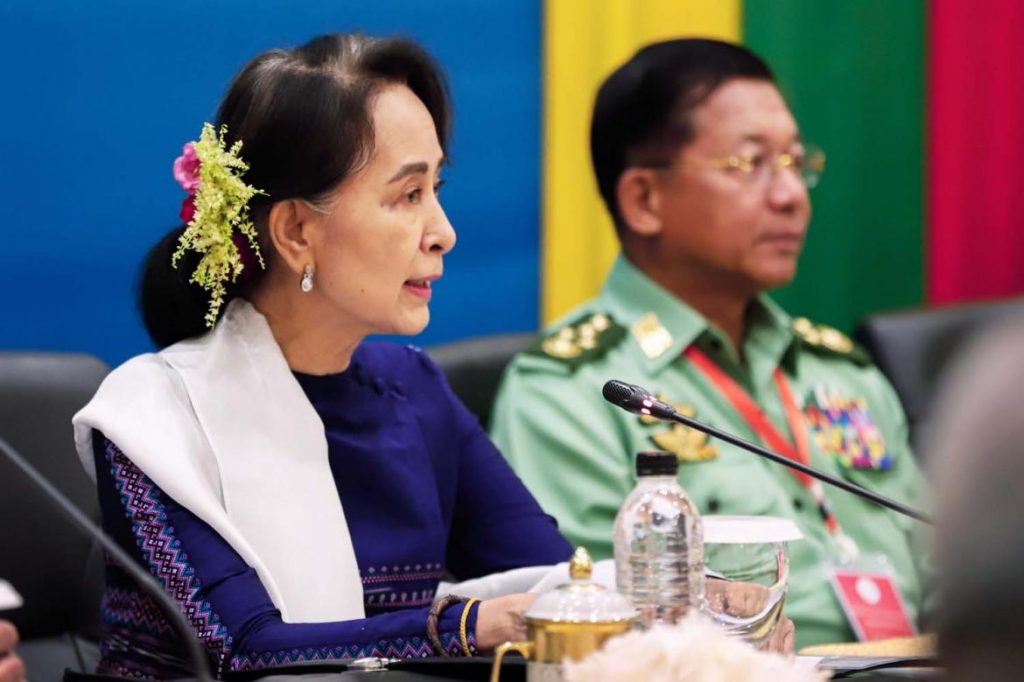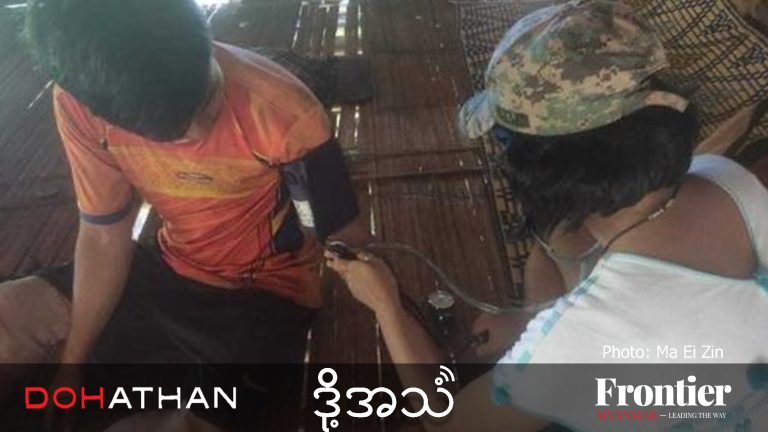The reluctance of the government to convene the powerful National Defence and Security Council has attracted the ire of the Tatmadaw and the opposition Union Solidarity and Development Party.
By SITHU AUNG MYINT | FRONTIER
DISCORD BETWEEN the Tatmadaw and the National League for Democracy government continues to make headlines, with the latest row focused on the powerful 11-member National Defence and Security Council.
Established under the military-drafted 2008 Constitution after the Union Solidarity and Development Party government took office in 2011, the NDSC is chaired by the president but dominated by the Tatmadaw, which controls six of its 11 votes. The NDSC met regularly under the USDP government but has never been formally convened since the NLD took office, to the obvious irritation of the Tatmadaw, which recently criticised the hiatus.
In a related move in the Pyidaungsu Hluttaw on September 20, 145 unelected Tatmadaw MPs and elected USDP lawmakers proposed an amendment to the constitution that would strengthen the NDSC and require it to meet at least once every two months and to convene if requested by five of its members. The proposed amendment also provides for the president to dissolve the Hluttaw under certain circumstances.
At a news conference in Nay Pyi Taw on September 28, the Tatmadaw made clear its displeasure over the refusal of the NLD government to convene a meeting of the NDSC. In a question directed to the government, the deputy-chairman of the Tatmadaw’s True News Information Team, Major-General Tun Tun Nyi, asked, “Will an NDSC meeting only be called if war breaks out?”
Support more independent journalism like this. Sign up to be a Frontier member.
He said the council needed to meet regularly to assess the security situation in the country. “We must work for security step by step – the process starts at the top and goes down to the bottom. It cannot be done unsystematically. All must work together after consulting each other because there are now some serious situations regarding national security and peace,” Tun Tun Nyi said.
The government also came under criticism from Pyithu Hluttaw MP U Maung Myint (USDP, Mingin), who was a deputy foreign minister in the USDP government. Speaking on Voice of America, he said, “The president and the state counsellor [Daw Aung San Suu Kyi] might be well educated, but why don’t they want to cooperate with 11 people, some of whom have a military point of view, for the interest of the country’s security and defence.”
He said that under the constitution there were situations in which the president could not act alone but only after “coordinating” with the NDSC, for instance when declaring a state of emergency. “There is instability across Myanmar, in all four corners: east, west, north and south,” Maung Myint said.
He said the regular NDSC meetings held under the USDP government were sometimes also attended by himself in his capacity as deputy foreign minister, as well as the information minister and the national police chief, who don’t normally sit on the council. Besides defence and security affairs, the meetings also discussed the economy, he said.
Apart from the president and the Tatmadaw commander-in-chief, the 11 members of the NDSC are the first and second vice-presidents, speakers of the Pyithu Hluttaw and Amyotha Hluttaw, deputy Tatmadaw commander-in-chief, and ministers of defence, home affairs, foreign affairs and border affairs. Aung San Suu Kyi is a member of the council in her capacity as foreign minister.
Although the NLD has never convened a meeting of the NDSC, it has called meetings that were attended by all 11 members of the council, among others, such as the “special meeting on national security and defence” held on October 14, 2016, soon after the first series of coordinated attacks on security posts in northern Rakhine State by the Arakan Rohingya Salvation Army.
The NLD government has never explained why it has not convened an NDSC meeting. However, the constitution does not make clear how NDSC meetings may be convened and how it may make decisions. It is therefore reasonable to assume that the NLD government is not in breach of the constitution by opting not to formally convene council meetings.
Section 204 of the constitution says the president has the power to grant amnesties based on recommendations by the NDSC. Section 324 says the president “shall appoint the Commander-in-Chief of the Defence Services with the proposal and approval of the National Defence and Security Council”. These sections are likely to be of little concern to the NLD, but it might be uncomfortable about the provisions on declaring a state of emergency as outlined in chapter 11 of the constitution.
In this chapter, section 417 says, “If there arises or if there is sufficient reason for a state of emergency to arise […] the President may, after coordinating with the National Defence and Security Council, promulgate an ordinance and declare a state of emergency.”
Section 418(a) says this declaration entails “the transferring of legislative, executive and judicial powers” to the Tatmadaw commander-in-chief. Not only would the Hluttaw be suspended, it would also be dissolved if its term ends during a state of emergency.
A likely reason why a president under an NLD government would not convene a meeting of the NDSC is that the six Tatmadaw-affiliated members might cite the deteriorating situation in some parts of the country to demand or announce a state of emergency.
An analysis of the comments by Tatmadaw spokesperson Tun Tun Nyi at the Tatmadaw news briefing and USDP MP Maung Myint on VOA suggests that a majority of members on the NDSC could take such a course of action.
If an emergency situation were declared early in the tenure of the Hluttaw, it would not be a problem. However, it would be worrisome if such a declaration were made less than 18 months before the term of the Hluttaw was due to expire, a period that under normal circumstances would include a general election.
The constitution says an emergency can be declared, initially, for one year and may be extended twice for six months each, making a total of two years. If the tenure of the president and vice president expired while the country was under a state of emergency, it would mean that the most powerful decision-making body in the country would be the NDSC. In such a situation, the constitution says that the NDSC would be responsible for organising and holding elections and would hold power until there was a new Hluttaw, a new president and a new government.
Such a scenario concerns the NLD because it could lead to a period of direct military rule, from which the country finally emerged in 2011 after more than 50 years. To conclude, the period leading up to the 2020 general election will be crucial for the future of democracy in Myanmar, and could determine whether it advances or retreats.







